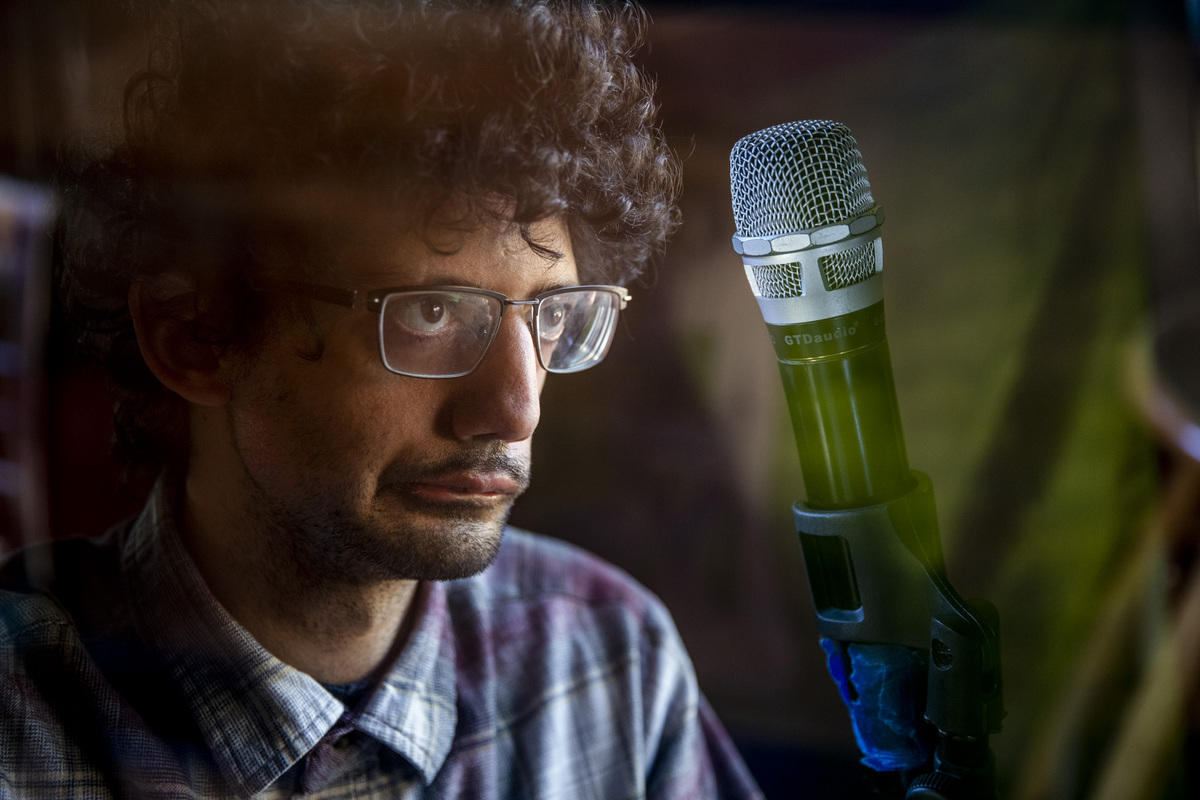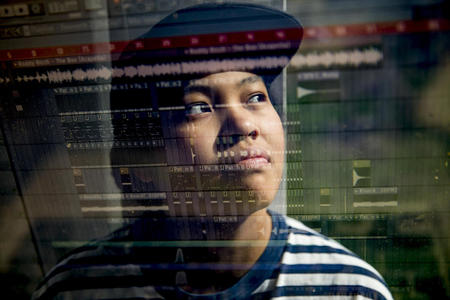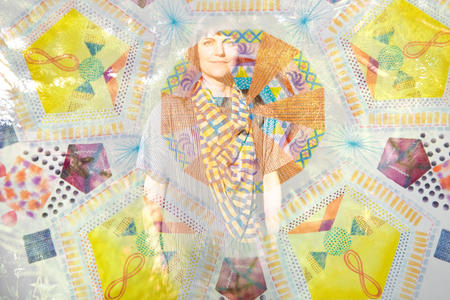“On TV, you see people fighting over something at Costco like toilet paper,” Hurwitz says. “Here, people are going crazy for grass-fed, free-range organic beef. It’s a weird upper-middle-class apocalypse.”
It’s not hard for Hurwitz to find the funny in dire situations. (For example, he says the coronavirus quarantine is a lot like Passover: you stay home and wash your hands a lot.) The local comedian has never been officially diagnosed, but suspects he has Moebius syndrome, a rare genetic disorder. He does have several of the characteristics, including two fingers on each hand, and partial face paralysis.
Hurwitz often jokes that people with a full set of digits are from “the five-finger community.” His comedic range includes dark humor, political sarcasm and social commentary. Amid the fast-changing era of coronavirus, he says it’s funny that he’s become sort of a first responder, except he’s bagging groceries and stocking shelves.
In addition to working the front lines at the grocery, Hurwitz hosts a hyperlocal political satire news segment for the Joketellers Union show at the Clock-Out Lounge (this week it will be streamed live on Facebook). He also hosts The Disabled List, a monthly variety show for stand-up comedians with disabilities. And occasionally he drops into a new live streaming talk show called CoVideo-TV, which formed after many performers and artists lost their jobs due to the coronavirus quarantine. The irreverent program pegs itself as “the only pandemic based talk show” and streams live every Thursday at 7 p.m.
Comedy has given Hurwitz the ability to be accepted on his own terms, even when he bombs. He recalls an instance when the punchline for his usual opener didn’t quite land the way he expected:
“I know you maybe haven’t seen a lot of comedians like me before, but I hope if I do well here and really hit it out of the park, it will open up doors to more Jews in comedy.”
The audience sat silent. One person gave a lone woo, which Hurwitz says he interpreted as support of his Jewishness, rather than his disability (or his joke about the number of Jewish comedians).
In moments like these, Hurwitz says he “weirdly enough” finds validation in the fact that when he does get laughs, they are genuine: The audience accepts his disability but doesn’t let it define him — they view him as a comedian first.
This interview has been edited for length and clarity.
When did you start doing comedy?
In 2011. They used to offer this class through the University of Washington Experimental College. The guy who taught it was named Stu Stuart, which sounds like a stage name; maybe it was. It was based around creating four minutes of material [over] six weeks, the culmination of which was performing at The Comedy Underground. It was really fun to get on stage, that rush of adrenaline from the crowd. I really loved it, but I didn't know anyone in the scene. I didn’t start again until 2017, so it’s been three years of continuous comedy.
Why did you get back into comedy in 2017?
As someone who is mixed race, Jewish and Black, and also has a disability, it kind of felt like the Trump election was a rejection of me personally. A lot of people probably felt like that. I’m not sure if I consider comedy activism. I don't know if I can really change anything on a large scale, but I think what comedy can do is be a beacon for someone, like, “Oh, there's someone else who thinks the way I do. I'm not crazy.”
What do you like most about it?
It’s one of those mediums where the performer needs the audience as much as the audience needs the performer. One can’t exist without the other. Someone telling jokes to an empty room, or if I talked over by that weird metal structure, that wouldn't be stand-up comedy. You need a response or else it's just somebody talking to himself.
What about comedy in the age of coronavirus? How do you make this work if people can’t congregate?
I should say as a caveat, because of coronavirus, people are streaming comedy. My next Beacon Hill News segment will be virtual. [But] it’s not good for people who rely on comedy. I don’t rely on comedy for really any of my income. It's tough for people who rely on their art to make a living. There's no real template.
What’s the importance of comedy right now, amid all this uncertainty?
The role is to give people something to smile at. Everyone's pretty stressed out and worried about themselves or family members. I think that’s why comedy always has a place. This is an acutely tense time, but even on a normal week, people really appreciate getting off work, going to watch a show, laughing, letting the tension out. Comedy is such a communal experience. You can sit with people and laugh, and there's something cathartic about being a part of something fun, communal and joyous. But to go back to comedy in the time of corona — I don’t know. There’s no framework for something like this happening.
Have you always known you’re funny?
I’m confident in that I’m funny, not confident in general. We all have defense mechanisms for dealing with the terrible, terrible world. Comedy is just something I’ve always used. It probably comes from my family. My dad used to joke a lot. I was always good at making people laugh.
Why is it important for people to see comedians with disabilities?
Being disabled and being a comedian gives visibility to other people with disabilities, and it gives people an insight into something that they haven't thought about much. That's what any consumer of comedy — or any kind of art — is really looking for. How will this challenge me or make me look at things differently?
Does having a disability affect the way you do comedy?
Generally, if there's something distinctive about you, it’s a good idea to address it in the beginning. That way, one, you’re giving the audience permission to laugh at it and, two, you are answering any questions they may or may not have. But it's not all I want to talk about. My experience is certainly impacted by my disability, but I wouldn't say defined by that any more than it's defined by being a male or biracial or anything else. These are all pieces of a puzzle that partially define me.
How would you describe Seattle’s comedy scene?
There's a distinction between the scene that I'm a part of, which is a sub-scene, that has a lot of comedians of color, queer comedians, nonbinary comedians and comedy in Seattle more broadly. There are a lot of interesting voices in the queer POC scene. A lot of funny up-and-coming comics — Howie Echo-Hawk, Stephanie Nam, Bernice Ye — who are pushing the boundary on what comedy is, or challenging assumptions.
How does the local scene differ from comedy towns like Los Angeles or New York City?
I mean, you're probably not going to get discovered by Johnny Carson — he's dead, I think. But if that is the goal, you should be in New York City or LA. I've heard in New York City there are certain open mics you have to pay to go to. So you have to pay money to perform three minutes of comedy where nobody's even listening because they're all other comedians who are focused on what their jokes are going to be and that sounds awful. If you want to get better — if you want to be part of a community — Seattle’s a good place.
How has comedy changed your life?
It's been especially rewarding to do Beacon Hill News because I see a lot of the people who come out to the shows around Beacon Hill. It's really cool to find that connection. This is especially acute because of coronavirus, but even without corona, we live pretty isolating lives. With social media and being online all the time, it can be kind of lonely. It has definitely allowed me to be a part of a community. A community of other comics, but also, part of a community of people who enjoy comedy.






